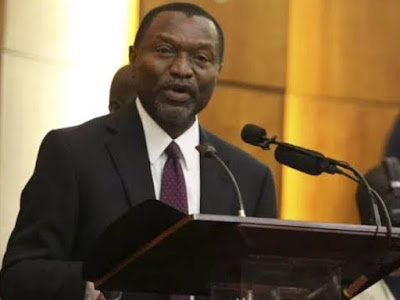 |
|
Budget and National Planning Minister, Senator Udo Udoma
|
Although current economic realities have threatened the smooth implementation of the 2016 Budget, the government will only consider a review when there are clear indications of a persistent fall in revenue expectations, the Budget and National Planning Minister, Senator Udoma Udo Udoma, has said.
He gave this indication while responding to questions at a Town Hall Meeting in Abuja on Tuesday.
‘’Although the disparity between projected revenue and actual receipts in the last two-quarters was obvious, the government was optimistic that the current situation will not prevail for long’’, the minister added.
The meeting which was inspired by the Nigerian Institute of Policy and Strategic Studies (NIPSS) focused on “Effective implementation of the 2016 Budget”.
Udoma said the government was keeping a close watch on the trend, particularly on the economic indicators, admitting that government is worried about the current trend which does not align with expectations as contained in the budget fundamentals.
The minister said however that if the downward trajectory persists, the government might make reasonable adjustments to accord with prevailing realities.
He explained that at the inception of the current Administration, the economy was facing several challenges including declining oil prices and production, which led to declining external reserves and GDP growth rate, adding that there was also rising inflation, increasing unemployment rate, insecurity, high cost of governance, corruption, infrastructure deficit and the worsening of key socio-economic indicators.
The 2016 budget, he explained, was therefore designed to deal with these problems and in doing so the government had to take a deliberate decision to deviate from the past by assigning a reasonable portion of the budget to infrastructure development.
The minister said this was not only to provide backbone infrastructure to the agriculture and solid mineral development, which are to redirect the country from sole dependence on oil for revenue, but to energise other sectors that are not fundamentally affected by government overheads that take the bulk of national budgets.
Senator Udoma said in spite of the dwindling resources, the government is determined to use the budget as an instrument to reflate the economy, which is why the budget was backed up with a Strategic Implementation Plan (SIP) to fundamentally address the challenges.
The SIP, he added, was to direct the trajectory of the national economy towards the path of sustainable development and inclusive growth; explaining that the Plan consists of 34 priority actions to be implemented along six major strategic areas namely Policy, Security & Governance; Diversity the Economy; Power, Rail & Roads; Oil and Gas Reforms; Ease of Doing Business; and Social Investment. The government has also set measurable targets for implementation. (ThisDay)

No comments:
Post a Comment